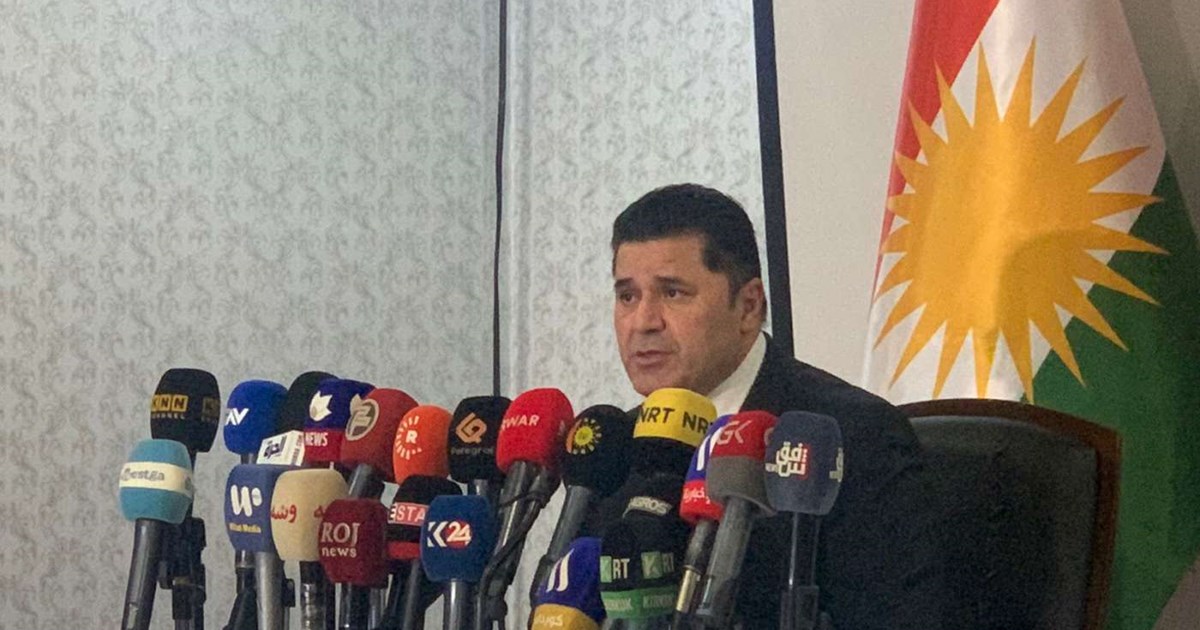Head of OCIA Held a Press Conference on the Eighth Anniversary of Shingal Genocide

Erbil, Kurdistan Region, Iraq (GOV.KRD) - KRG Coordinator for International Advocacy, Dr.Dindar Zebari on Wednesday held a press conference to underline the developments in holding ISIS terrorists accountable for perpetrating international crimes and to reiterate commitment in redressing the agonies of the Yezidi community on eighth anniversary of Shingal Genocide.
Eight years ago, the Yezidi community were brutally massacred and forced to flee their homes. So-called Islamic State (ISIS) terrorists launched a fierce attack on a number of areas of the Kurdistan Region, especially the areas inhabited by the Yazidis in Shingal. The terrorists, during their brutal raids, transcended all human norms and human rights principles towards the innocent populations of the region from killing and demolishing their homes until they reached the point of kidnapping women and children and their families and selling them in both Mosul and Syria.
Initially, the KRG Coordinator stated that the terrorist attacks also led to the displacement of hundreds of thousands of residents of these areas who fled to the Kurdistan Region to preserve their lives and build a mere hope of prosperity.
In highlighting the regional government’s efforts, Zebari remarked that “the Council of Ministers of the Kurdistan Region issued its decision No (5170) on 08/21/2014 to form a high committee to define the crimes that perpetrated against the Yezidis as genocide, and the committee has worked over the past years to internationalize the case and tried to echo their agonies to the International Criminal Court. Currently, the aforementioned committee is entitled the High Committee to Recognize ISIS Crimes as Genocide, and it continues its endeavor to materialize the feasible legislative and judicial grounds in the onset to carry out fair and robust prosecutions and hence to recognize the mass killings of Yezidis and the inhabitants of Nineva Plains as acts of genocide in the international platforms”.
In line with the mechanism in place, the KRG Office of the Coordinator for International Advocacy (OCIA) has followed up with the relevant authorities to gather evidence pertinent to ISIS crimes. In this respect, OCIA has set a route map with the relevant authorities to submit witness statements, interviews, and other collected evidence of the Yezidi survivors to the United Nations Investigative Team to Promote Accountability for Crimes Committed by Da'esh (UNITAD).
KRG Security authorities have also provided a wide range of reports and information in relation to ISIS leadership members and financing sources, in addition to lists of ISIS detainees under the custody of KRG security authorities to assist UNITAD's teams in processing the evidence that are essential for the prosecutions. As part of the digitization project, UNITAD has also been given access to all evidentiary archives in relation to ISIS crimes that have been collected and kept by the KRG, parallel to Iraq's compliance with UN Security Council Resolution No 2379 to prosecute ISIS for international crimes.
For the purpose of recognizing the crimes of ISIS terrorists, Dr. Dindar Zebari illustrated, “the regional government has documented the dossiers of thousands of Yezidi abductees. Archiving the documents of Yezidi abductees started on December 1, 2021 and concluded on April 3, 2022. Precisely, 3,543 case files (5,393 pages) have been archived during the aforementioned period. Furthermore, social and psychological support was provided to more than 2,234 victims. To document ISIS crimes, KRG has cooperated with UNITAD and, through the Commission of Investigation and Gathering Evidence (CIGE), succeeded in digitally archiving more than 73,912 pages of evidence for these crimes. Additionally, 4,206 cases will be submitted as lawsuits to the courts. Among them, 1,778 cases have currently been finalized and 2,428 are being prepared”.
Furthermore, he stated that “the regional government made unrelenting efforts to liberate the kidnapped persons, so it set up a committee to collect information and conduct follow up on the kidnapped’ dossier and earmarked a budget for this purpose. As of July 2022, 3,554 people have been rescued: of whom 1,207 are women, 339 are men, 1,051 are female children, and 957 are male children. Moreover, 2,717 people are still missing”.
The genocide that affected Sinjar district and its surroundings represents one of the most heinous crimes against humanity in modern history, and was part of a large-scale attack launched by ISIS terrorists against the people of Kurdistan. What happened in Sinjar is a catastrophe that shook the depths of our conscience and expressed the criminalized approach of this organization and its bloody ideology. Efforts must be intensified at home and abroad in order to define it as a crime of genocide and to find and return the abductees.
In his final remarks, the KRG Coordinator stated that “what can be secured in favor of the voluntary, dignified, and safe return of the displaced and immigrants from the Yezidis and other Iraqis who were forced by war circumstances to emigrate due to the terrorist aggressions and the threats they were exposed to, is the need to overcome political and administrative obstacles that prevent justice for the victims' families, and accelerate the formation of the administration in Sinjar, enhancing security and stability and providing material aid and basic services for their return from displacement camps to their indigenous homeland. In prospect, these steps can only be accomplished by the swift and actual implementation of the Shingal Agreement and fair prosecutions of ISIL detainees under international criminal law and in coordination with UNITAD.”
